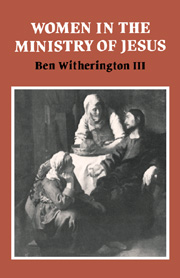 Women in the Ministry of Jesus
Women in the Ministry of Jesus 2 - Women in the Teaching of Jesus
Published online by Cambridge University Press: 17 August 2009
Summary
Our first task will be to examine the attitude of Jesus toward women as reflected in His teaching. This will entail a discussion of His views on parenthood, childhood and the single state, and on marriage, divorce and adultery. Through this investigation we should be able to begin to evaluate the way Jesus thought the new demands of the Kingdom would affect women in their roles as mothers, daughters, wives, widows, harlots and believers. The second half of this chapter will be devoted to an investigation of women in the parables and judgment sayings of Jesus.
The Physical Family
Parents, Children and Widows
At various times and for various reasons there has been a feeling of uneasiness on the part of many people about Jesus' view of the family. Some have been willing to say that for Jesus the claims of the family of faith necessarily supplant any claims of the physical family on Him and His followers. Yet there are clear indications in the Gospels that Jesus not only accepted but also strengthened the physical family's bond in some respects.
The Gospels reveal two separate instances where Jesus reaffirmed Exod. 20.12, Lev. 19.3, and Deut. 5.16, thus indicating that honouring one's parents was an important part of His teaching. The first instance comes in Mk 10.19 and parallels where Jesus indicates that the keeping of certain of the Ten Commandments is crucial if one wishes to inherit eternal life.
- Type
- Chapter
- Information
- Women in the Ministry of JesusA Study of Jesus' Attitudes to Women and their Roles as Reflected in His Earthly Life, pp. 11 - 52Publisher: Cambridge University PressPrint publication year: 1984


